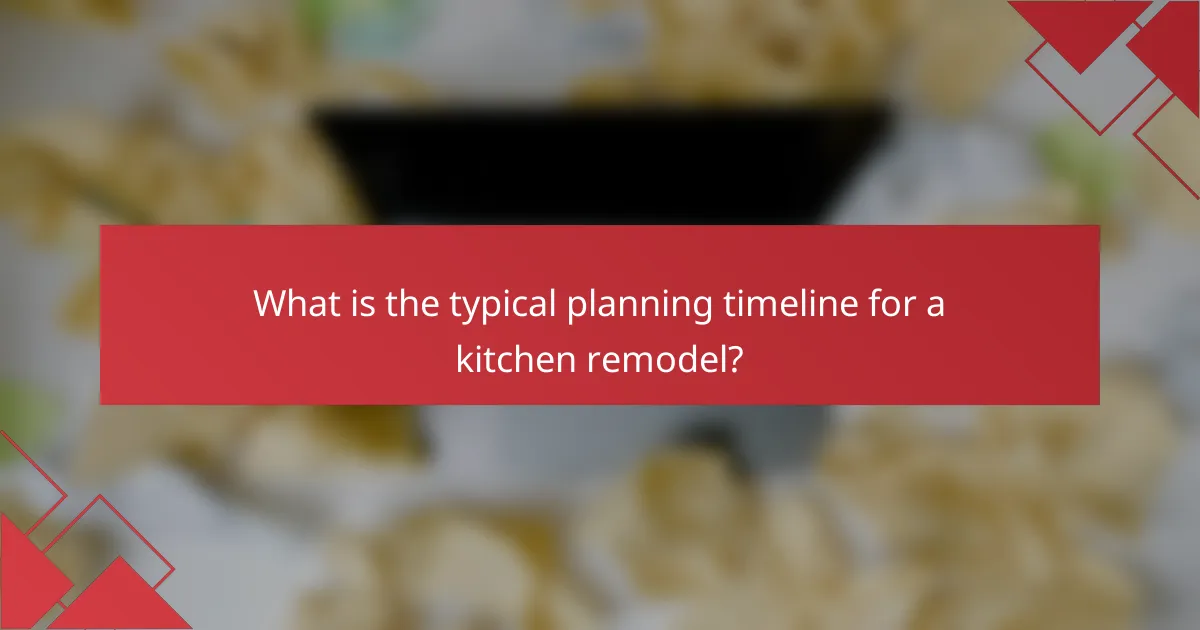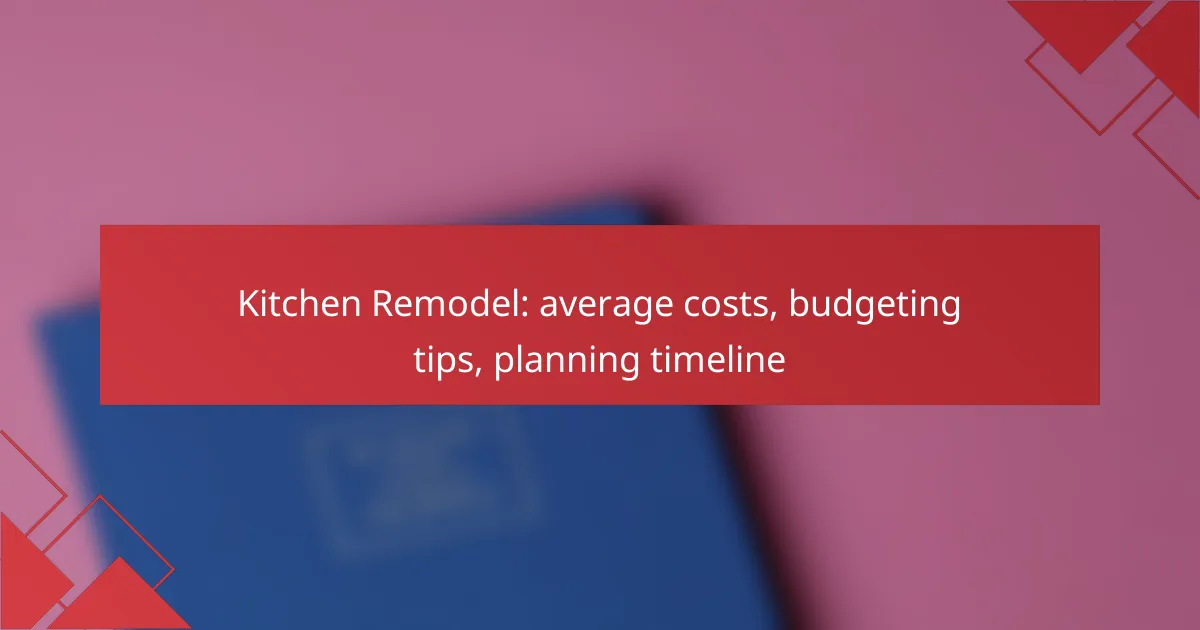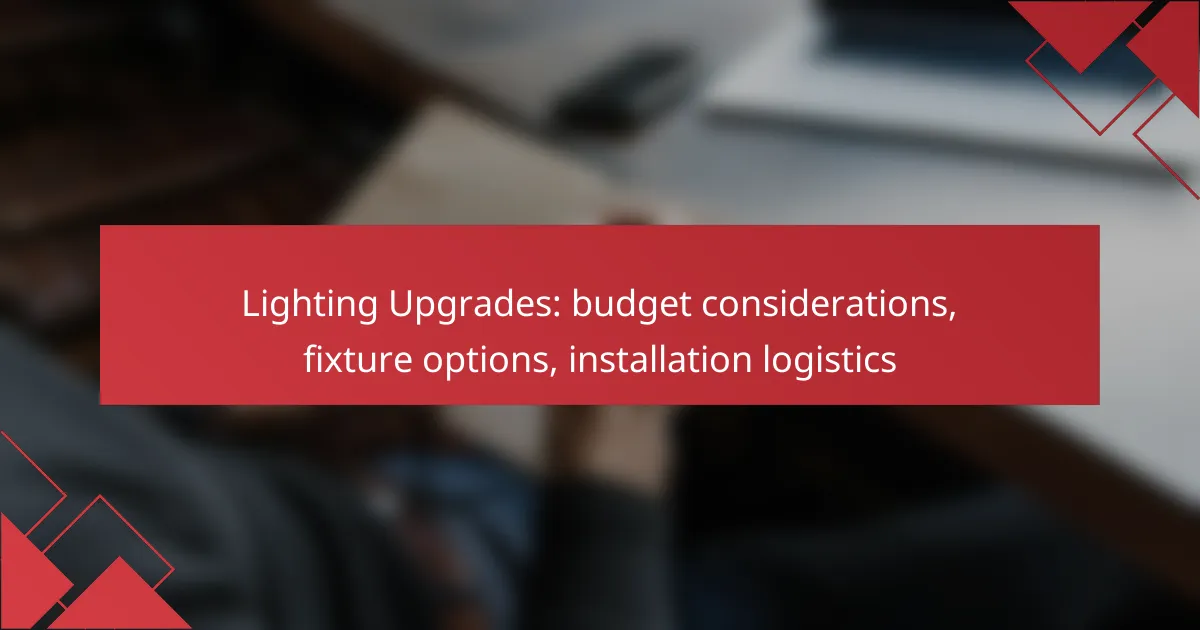Remodeling your kitchen can be an exciting yet challenging endeavor, with average costs in the UK ranging from £5,000 to £30,000 based on various factors. Effective budgeting is crucial, as it involves estimating expenses and preparing for unforeseen costs to keep your project on track. Additionally, a well-planned timeline is essential, typically spanning several months, to accommodate design, permits, and construction phases for a successful renovation.

What is the average cost of a kitchen remodel in the UK?
The average cost of a kitchen remodel in the UK typically ranges from £5,000 to £30,000, depending on the size and scope of the project. Factors such as materials, labor, and design choices significantly influence the final price.
Average cost range for small kitchens
For small kitchens, which are generally under 10 square meters, the average remodel cost can range from £5,000 to £15,000. This budget usually covers basic updates like new cabinets, countertops, and appliances.
Homeowners should consider prioritizing essential upgrades to maximize value within this budget. Simple changes, such as repainting or updating fixtures, can also enhance the space without significant expense.
Average cost range for medium kitchens
Medium kitchens, typically between 10 and 15 square meters, usually cost between £15,000 and £25,000 to remodel. This range allows for more extensive renovations, including layout changes and higher-end materials.
Investing in quality appliances and durable surfaces can improve both functionality and aesthetics. It’s wise to allocate part of the budget for unexpected costs, which often arise during renovations.
Average cost range for large kitchens
Large kitchens, exceeding 15 square meters, can cost anywhere from £25,000 to £50,000 or more. This price range accommodates comprehensive renovations, including custom cabinetry, premium appliances, and extensive structural changes.
When planning a large remodel, consider hiring a designer to optimize the layout and ensure the project meets your needs. This investment can lead to a more cohesive and functional kitchen.
Factors influencing kitchen remodel costs
Several factors can influence the costs of a kitchen remodel, including the choice of materials, the complexity of the design, and labor costs in your area. High-quality materials and custom designs typically increase the overall budget.
Additionally, the condition of existing plumbing and electrical systems can impact expenses. Upgrading these systems may be necessary for safety and compliance, adding to the overall cost.
Finally, local market conditions and the availability of skilled labor can also affect pricing. It’s advisable to obtain multiple quotes from contractors to ensure competitive pricing.

How to budget for a kitchen remodel?
Budgeting for a kitchen remodel involves estimating costs, setting limits, and planning for unexpected expenses. A well-structured budget helps ensure that your project stays on track financially while meeting your design goals.
Setting a realistic budget
To set a realistic budget for your kitchen remodel, start by researching average costs in your area. In the United States, kitchen remodels can range from $15,000 to over $50,000, depending on the scope and materials used. Consider factors such as labor, cabinetry, countertops, appliances, and permits.
Break down your budget into categories to see where your money will go. Allocate funds for essential items first, then decide how much you can spend on upgrades or luxury features. This approach helps prioritize spending and prevents overspending.
Common budgeting mistakes
One common mistake is underestimating costs, particularly for labor and unexpected repairs. Always include a contingency fund of about 10-20% of your total budget to cover unforeseen expenses. Failing to account for this can lead to financial strain during the project.
Another mistake is neglecting to research material prices thoroughly. Prices can vary significantly between suppliers, so shopping around can save you money. Additionally, avoid making last-minute changes, as they can disrupt your budget and timeline.
Tips for cost-saving
To save costs on your kitchen remodel, consider refacing cabinets instead of replacing them. This can reduce expenses while still giving your kitchen a fresh look. Opting for mid-range appliances rather than high-end brands can also help keep your budget in check.
Another effective strategy is to tackle some tasks yourself, such as painting or demolition, if you have the skills and time. However, be cautious with complex tasks like plumbing or electrical work, as these often require professional expertise to ensure safety and compliance with local codes.
- Plan for seasonal sales on appliances and materials.
- Reuse existing fixtures when possible.
- Consult with a designer for cost-effective layout changes.

What is the typical planning timeline for a kitchen remodel?
The planning timeline for a kitchen remodel generally spans several months, depending on the project’s scope and complexity. Homeowners should anticipate a timeline that includes design, permits, and construction phases to ensure a smooth process.
Phases of a kitchen remodel timeline
A kitchen remodel typically consists of three main phases: design, permitting, and construction. The design phase involves selecting layouts, materials, and finishes, while the permitting phase ensures compliance with local building codes. Finally, the construction phase is when the actual work takes place, transforming the kitchen space.
Average duration for each phase
The design phase can take anywhere from a few weeks to a couple of months, depending on the complexity of the project and the decision-making speed of the homeowner. The permitting phase usually lasts 2 to 6 weeks, varying by local regulations and the efficiency of the permitting office. Construction can range from a few weeks to several months, influenced by the extent of the remodel and contractor availability.
Factors affecting the timeline
Homeowners should also consider contractor availability and the potential for unexpected issues, such as plumbing or electrical problems, which may arise during construction. Planning for these variables can help mitigate delays and keep the project on track.

What are the key considerations before starting a kitchen remodel?
Before starting a kitchen remodel, it’s crucial to evaluate your goals, budget, and the overall design. Understanding these key considerations will help ensure a successful renovation that meets your needs and preferences.
Assessing kitchen layout and design
Begin by analyzing your current kitchen layout and how it functions for your lifestyle. Consider the work triangle concept, which emphasizes the efficiency of the stove, sink, and refrigerator placement. A well-planned layout can enhance usability and flow.
Think about whether you want an open-concept design or a more traditional layout. Each option has its pros and cons, such as increased space versus privacy. Sketching your ideas or using design software can help visualize the changes.
Choosing materials and finishes
Selecting the right materials and finishes is essential for both aesthetics and durability. Common choices for countertops include granite, quartz, and laminate, each varying in price and maintenance needs. For cabinetry, solid wood offers longevity, while plywood can be a cost-effective alternative.
Consider the overall style you want to achieve, whether modern, rustic, or traditional. Pay attention to color schemes and textures, as they can significantly impact the kitchen’s atmosphere. Always request samples to see how materials look in your space before making final decisions.
Hiring contractors vs DIY
Deciding between hiring contractors or taking a DIY approach depends on your skill level, time, and budget. Hiring professionals can ensure quality work and adherence to local building codes, which may save you from costly mistakes. However, this option typically requires a higher financial investment.
If you choose to DIY, focus on tasks that match your expertise, such as painting or installing fixtures. Be realistic about your capabilities and the time commitment involved. Creating a detailed plan and timeline can help keep the project on track and manageable.

What are popular kitchen design trends in the UK?
Popular kitchen design trends in the UK focus on functionality, sustainability, and technology integration. Homeowners are increasingly opting for modern aesthetics combined with eco-friendly materials and smart appliances to enhance their cooking spaces.
Modern kitchen styles
Modern kitchen styles in the UK often feature clean lines, minimalist designs, and open layouts. Popular choices include handleless cabinetry, large islands, and neutral color palettes that create a sleek and spacious feel.
Consider incorporating elements like quartz countertops or matte finishes to achieve a contemporary look. Mixing materials, such as wood with metal accents, can also add visual interest while maintaining a modern vibe.
Eco-friendly materials
Eco-friendly materials are gaining traction in UK kitchen designs, with homeowners prioritizing sustainability. Options such as reclaimed wood, bamboo, and recycled glass not only reduce environmental impact but also offer unique aesthetics.
When selecting materials, look for certifications like FSC (Forest Stewardship Council) to ensure responsible sourcing. Additionally, consider energy-efficient appliances that complement eco-friendly designs and contribute to lower utility bills.
Smart kitchen technology
Smart kitchen technology is transforming how UK homeowners interact with their cooking spaces. Devices like smart refrigerators, voice-activated assistants, and app-controlled ovens enhance convenience and efficiency.
When integrating technology, focus on user-friendly systems that simplify meal preparation and kitchen management. Ensure compatibility with existing devices and consider future-proofing your choices to accommodate evolving tech trends.

How to choose the right kitchen contractor?
Choosing the right kitchen contractor involves assessing their experience, credentials, and past work. A qualified contractor can significantly impact the quality and efficiency of your kitchen remodel.
Evaluating contractor credentials
Start by verifying the contractor’s licenses and insurance. Most states require contractors to hold specific licenses, and having insurance protects you from liability in case of accidents during the remodel.
Check for certifications from recognized organizations, which can indicate a commitment to quality and professionalism. Look for affiliations with local builders’ associations or the National Kitchen & Bath Association (NKBA).
Request references and review their past projects. A reputable contractor should provide a portfolio showcasing completed kitchen remodels, along with contact information for previous clients who can share their experiences.










